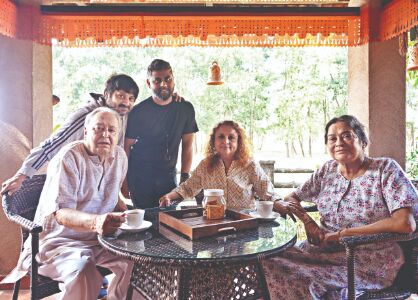The political Soumitra
Unlike the thespians of Hindi film, Chatterjee’s steady political articulation made him a conscientious actor-citizen — leading a rich life beyond the silver screen; writes Annie Domini

In a scene from the 1966 film 'Nayak', the hero Arindam Chatterjee, played by the Bengali matinee idol Uttam Kumar, refuses to alight from his car and address a striking workers' gathering, despite his trade unionist friend pleading him to say a few words to the hungry labourers. Soumitra Chatterjee's one abiding regret had been that Satyajit Ray denied him the lead role in 'Nayak', and had Uttam Kumar bring to life a character that was the celluloid demigod's doppelganger, as it were. Yet, Chatterjee knew deep in his heart that it was a role that he couldn't have essayed as viscerally as Uttam had. Chatterjee would have got down from his car and addressed the workers, perhaps even given them company in their strike, until their demands were met.
Glamour and glitz of movies have been too heavy a burden on the shoulders of many movie stars to adequately mingle with the jungle of street politics, even though sympathies of the actors often lay with the toiling masses of the country. But not everyone had the time and inclination to move beyond the demands of the silver screen. Many a time, the progressiveness was confined to the movie script, causing the divide between the tinsel town and the real world to grow exponentially. Soumitra Chatterjee, who died at the age of 85 after a 40-day battle with complications following COVID-19, was not part of this pack.
Chatterjee was indeed Satyajit Ray's discovery, along with Sharmila Tagore, when they were introduced together in 'ApurSansar' (The World of Apu), the last of the Apu trilogy, which brought Ray and his co-actors instant international acclaim. It was working with Ray and being mentored by Ray that familiarised Chatterjee to the collaborative art that film-making was; how every little detail visible on-screen hinged on many tiny but crucial decisions as well as technical and aesthetic cooperation that involved many hands in addition to the writer-director's. From cinematography to lighting, to sound editing, to background music, to film editing, there were aspects that Chatterjee correctly understood to be indispensable for film-making, and he had always stood by the technical crew in demanding fair wages and safety nets for all.
Beyond Satyajit Ray, with whom Chatterjee worked in 14 of his 29 films, the actor was cast in unforgettable roles in films by Tapan Sinha, Mrinal Sen, Ajay Kar, Shyam Benegal, Aparna Sen, Goutam Ghose, Rituparno Ghosh, among others. Chatterjee's equal passion in theatre, literature and culture of Bengal was evident from his formidable oeuvre — his books of essays and poetry, his literary magazine 'Ekkhon', his plays and Bengali adaptations of European and Anglo-American dramas. No wonder, after Satyajit Ray and Utpal Dutt, Soumitra Chatterjee has been hailed as a Renaissance man, whose cultural footprint for Bengalis is way too vast to be adequately summarised in a single column.
Yet, Chatterjee's staggering output — 300 films, theatre, painting, poetry, literary criticism, elocution — notwithstanding, it was his thorough decency that informed his unshakeable political core. This 'gentleman star', the quintessential 'bhadralok' who lived simply in a middle-class neighbourhood of Kolkata, bought his own fish, vegetables and groceries from the market, welcomed guests dressed in a 'lungi' and 'panjabi' (kurta in Bengali) in an outhouse study crammed with books, was always a phone call away from fans and creative folks alike helped umpteen number of young entrants and those who had fallen by the wayside — also had entrenched a humanist worldview carved in him by internationalists like Tagore and Ray.
While Chatterjee played the nationalist revolutionary Sandip with conviction in 'Ghare Baire', Ray's cinematic adaptation of Tagore's novella that's a force of nature at any time, during any era, he remained a trenchant critique of nationalist fanaticism and particularly Hindu nationalism. Chatterjee remained committed to a secular left-wing view of the world, with democratic socialism paving an equal society that's freer, fairer and just to all. Chatterjee had added his name to several letters written by intellectuals and cultural torchbearers in the country, who were pained to see the ravages of Hindutva in every sphere of sociopolitical life. He called out the atmosphere of intolerance that has been the hallmark of the past several years. He attended several anti-CAA-NRC rallies in Kolkata and wrote his name on walls carrying names of those ordinary and extraordinary individuals against the anti-constitutional, anti-secular, anti-Indian move by the central government.
Bengali film industry is blessed with politically astute observers of life, and Chatterjee was easily the first among equals, a legend and a lodestar of aesthetics, ethics, screen presence and compassion. Unlike the thespians of Hindi film industry such as Amitabh Bachchan, Chatterjee's steady and strong political articulation made him a conscientious actor-citizen, who led a rich life beyond the silver screen, beyond his international glamour as Ray's muse. Showered with honours such as Padma Bhushan, Dada Phalke Award, the French Legion of Honour, among others, Chatterjee wore them lightly, unencumbered by any heaviness of being. Just like his utterly decent character, his politics of decency and accessibility was also a defining trait that lived and grew within him to touch others in marvellous ways.
Views expressed are personal



